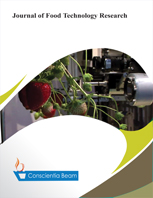Thermal, mechanical and electrical properties of selected tropical roots and tubers crops
DOI:
https://doi.org/10.18488/jftr.v11i2.3741Abstract
Roots and tubers, essential food crops with substantial industrial potential in Sub-Saharan Africa, face underutilization in Nigeria, where only approximately 5 % of the produced root and tuber crops find industrial applications. This study explores the physical, thermal, mechanical, and electrical properties of water yam (Dioscorearotundata), white yam (Dioscoreaalata), bitter yam (Dioscoreadumetorum), cocoyam (Colocasia esculenta), and sweet potato (Ipomoeabatatas). The weight of the roots varied widely, ranging from 41.22 g to 1169.80 g for cocoyams and white yams, while density varied from 1332.99 g/mm³ to 1990.35 g/mm³ for cocoyam and bitter yam, respectively. Thermal conductivity of the products ranged from 0.4042 to 0.4729 Wm⁻¹K⁻¹, with specific heat capacity, latent heat of fusion, and thermal diffusivity measured between 0.4042 to 0.4729 Wm⁻¹K⁻¹, 2.777 to 3.303 S/cm, 167.44 to 228.54 kJ Kg⁻¹K⁻¹, and 6.414 to 9.933 kJ K⁻¹, respectively. Compressive and tensile strengths varied from 0.609 to 2.354 kN and 0.091 to 0.822 kN, respectively, showcasing notable differences among the root and tuber crops. Furthermore, the electrical conductivity ranged from 1145 to 1701 μS/cm. This study underscores the significant variations in the physical characteristics of root and tuber crops. Notably, the thermal properties, mechanical properties, and electrical conductivity of these crops exhibit interdependence, likely influenced by moisture content.

